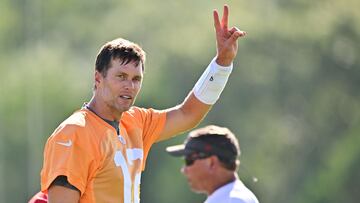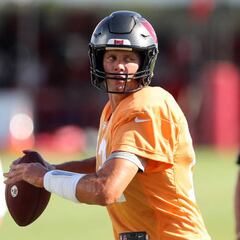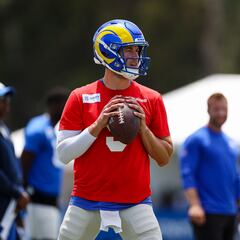Why wasn’t Tom Brady punished along with the Miami Dolphins for ‘tampering?’
The league’s anti-tampering policy makes for some interesting reading, and is also the reason why the star QB was not punished for his role in the scenario.


With of the NFL’s sanctions against the Miami Dolphins now making the rounds, many wondered whether or not the legendary QB would also be implicated in the ‘tampering’ case, but now it seems that’s in the clear.
NFL won’t punish Tom Brady for ‘tampering’
According to reports on Tuesday, won’t be taking any action against Tom Brady. The news, comes on the back of intense speculation about whether or not Brady would be punished, after the Dolphins and owner Stephen Ross received sanctions from the NFL, for their part in a ‘tampering’ scenario which was investigated by the league. Indeed, following several months’ worth of an official NFL probe into the franchise, the Dolphins were finally found to be guilty of tampering due to their contact with Brady on TWO separate occasions while he was under contract with another team - the Tampa Bay Buccaneers.
To be clear: There are no findings or discipline for Tom Brady or Sean Payton, per @NFLprguy. This matter is close for them https://t.co/Fln0tyStOU
— Ian Rapoport (@RapSheet) August 2, 2022
With regards to what the league actually found, take a look below:
The Dolphins had impermissible communications with quarterback Tom Brady in 2019-20, while he was under contract to the New England Patriots. Those communications began as early as August 2019 and continued throughout the 2019 season and postseason. These numerous and detailed discussions were conducted by Mr. Beal, who in turn kept Mr. Ross and other Dolphins executives informed of his discussions with Mr. Brady.
The Dolphins again had impermissible communications with both Mr. Brady and his agent during and after the 2021 season, while he was under contract to the Tampa Bay Buccaneers. Those discussions began no later than early December 2021 and focused on Mr. Brady becoming a limited partner in the Dolphins and possibly serving as a football executive, although at times they also included the possibility of his playing for the Dolphins. Both Messrs. Ross and Beal were active participants in these discussions.
In January 2022, the Dolphins had impermissible communications with Don Yee, the agent for New Orleans Saints’ head coach Sean Payton, about having Mr. Payton serve as Miami’s head coach. Miami did not seek consent from New Orleans to have these discussions, which occurred before Coach Payton announced his decision to retire as head coach of the Saints. Following that announcement, Miami requested permission to speak to Coach Payton for the first time, which New Orleans declined to grant.
Sean Payton also escaped punishment from the NFL
Interestingly, the other individual associated with the ‘scandal’ was also cleared of any wrong doing. Now retired NFL coach Sean Payton, has seemingly got himself in the clear where the league is concerned, however, the Dolphins franchise was not nearly so lucky. In addition to owner Ross’ $1.5 million fine and subsequent suspension - until October 17th - the team itself was docked two draft picks: a 2023 first-rounder and 2024 third-rounder.
Why isn’t Tom Brady being punished?
Related stories
Here’s the interesting thing about the NFL’s anti-tampering: one way or another it’s on the team to sort it out. What does that mean? If we take Brady’s example, what that means is this: If Miami contacted him first, then it’s an open and shut case and they should be punished. If, however, it was Brady who made the move, then it’s on the team to report his action to the NFL and failure to do so results in punishment. Curious about what exactly that looks like in the league? Then you can take a look at the NFL’s anti-tampering policy here. In the meantime, take a look below for an extract:
NFL also determined "the Dolphins did not intentionally lose games during the 2019 season. Nor did anyone at the club, including Mr. Ross, instruct Coach Flores to do so. No witness contended otherwise."
— Adam Schefter (@AdamSchefter) August 2, 2022
Today's penalties are all about tampering with Tom Brady and Sean Payton.
“If a club is contacted by a player (or his representative) who is under contract to or whose negotiating rights are held by another club, and such player has not been given permission to negotiate with other clubs, or such player is not in a permissible negotiating period under the terms of an operative collective bargaining agreement, then the contacted club is prohibited from (i) negotiating with the player or his agent; (ii) discussing even in general terms the player’s possible employment with the contacted club; or (iii) discussing the player’s contract or his potential or ongoing contract negotiations with his current club.”

